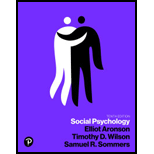
Introduction
The human mind cannot help but create categories that put some people into one group based on certain traits and others into an entirely different group as a result of their features. We find stereotypes about various groups that are partly influenced by the perceptions that we have formed about people over time, but it is not limited to these perceptions alone.
Explanation of Solution
Correct answer and explanation
The best answer is (A), in which social neuroscience findings suggest that there is an evolutionary benefit for the brain to quickly create categories. Social neuroscientists have found that forming categories serve as an adaptive mechanism, which is more or less hardwired into the human brain. Humans start engendering categories nearly as soon as they are born. For instance, while a newborn’s preference for race is not inborn, if they live in a “monoracial” world, they will demonstrate a preference for faces of their own race at a very young age. Thus, while we are born with the ability to discern different categories, experience helps us shape that ability right at the commencement.
Explanation for incorrect statements
Option (B) refers to the tendency to categorize and stereotype being largely determined by experience. However, while experience plays some role in shaping this ability, our tendency to categorize and stereotype is largely inborn. So, option (b) is incorrect.
Option (C) refers to people in some cultures stereotyping more than others. However, within a given culture, the pictures or stereotypes people form tend to be pretty similar. So, option (c) is incorrect.
Option (D) refers to experience playing no role in noticing different categories. However, experience actually plays an important role in helping to shape this ability to categorize. So, option (d) is incorrect.
Therefore, the options (B), (C), and (D) are incorrect.
Want to see more full solutions like this?
Chapter 13 Solutions
Social Psychology (10th Edition)
- 2. How would you compare the lives of poor people living in the low-income nations of the world with those in cities and rural areas of the United States? In what ways are their lives similar? In what ways are they different?arrow_forwarddiscuss the critisism of functionslism theoryarrow_forwardHow have economic crises such as the Great Depression, the 2008–2009 recession, and the COVID-19 pandemic impacted families in both practical and emotional ways? How do these events continue to shape family life today? In what ways has the definition and structure of “family” evolved in the 21st century? How do these changes reflect broader shifts in societal values, gender roles, and legal recognition of diverse relationships? What are some of the major economic and social challenges facing families today, and how do these challenges differ across social class levels, particularly for working-class and middle-class families? How do you think the increasing visibility of same-sex families, domestic partnerships, and cohabitation without marriage will influence societal norms and policies around family in the coming decades? Given current trends, what do you envision family life will look like in the future—by 2030 or 2040? How might factors like technology, economic instability,…arrow_forward
- You have decided to study global wealth and poverty. How would you approach your study? What research methods would provide the best data for analysis? What might you find if you compared your research data with popular presentations—such as film and advertising—of everyday life in low- and middle-income countries?arrow_forwardWhat are the PROs and CONs of the Guardian Mindset basd on mindsets in policing by Mike D'Antonio in a TEDx Talks presentation?arrow_forwardDiscuss one example of each of these… A time that someone gave you legitimate criticism that you could learn from. A time that someone gave unfair criticism which you should not be hurt by. A time that you criticized someone, perhaps accurately, but you delivered your criticism so harshly that the other person could not take it in. How could you have said it better?arrow_forward
- prepare a written response which compares and contrast Zimbardo’s Theory of Individuation with Social Identity Theory.arrow_forwardhumanized/simple answers for each: How did the field of gifted education evolve, and why is it important for giftedness to be recognized as an exceptionality? How do we define “gifts and talents,” and how are students identified? What are some characteristics of students with gifts and talents, and how can the information processing model (IPM) help us understand their needs? Why do students from culturally and linguistically different or socioeconomically disadvantaged homes and twice exceptional student continue to be under-identified for gifted-educational supports and services? What educational responses are needed to address the strengths and challenges of students with gifts and talents? What life course considerations are important for students with gifts and talents?arrow_forwardConduct an Internet search for websites that could be either resource cites or listservs for individuals who have special gifts and talents. From this search, compile a list of 5–10 Internet addresses for (a) parents with children who have special gifts and talents and (b) educators.arrow_forward
 Social Psychology (10th Edition)SociologyISBN:9780134641287Author:Elliot Aronson, Timothy D. Wilson, Robin M. Akert, Samuel R. SommersPublisher:Pearson College Div
Social Psychology (10th Edition)SociologyISBN:9780134641287Author:Elliot Aronson, Timothy D. Wilson, Robin M. Akert, Samuel R. SommersPublisher:Pearson College Div Introduction to Sociology (Eleventh Edition)SociologyISBN:9780393639407Author:Deborah Carr, Anthony Giddens, Mitchell Duneier, Richard P. AppelbaumPublisher:W. W. Norton & Company
Introduction to Sociology (Eleventh Edition)SociologyISBN:9780393639407Author:Deborah Carr, Anthony Giddens, Mitchell Duneier, Richard P. AppelbaumPublisher:W. W. Norton & Company The Basics of Social Research (MindTap Course Lis...SociologyISBN:9781305503076Author:Earl R. BabbiePublisher:Cengage Learning
The Basics of Social Research (MindTap Course Lis...SociologyISBN:9781305503076Author:Earl R. BabbiePublisher:Cengage Learning Criminalistics: An Introduction to Forensic Scien...SociologyISBN:9780134477596Author:Saferstein, RichardPublisher:PEARSON
Criminalistics: An Introduction to Forensic Scien...SociologyISBN:9780134477596Author:Saferstein, RichardPublisher:PEARSON Sociology: A Down-to-Earth Approach (13th Edition)SociologyISBN:9780134205571Author:James M. HenslinPublisher:PEARSON
Sociology: A Down-to-Earth Approach (13th Edition)SociologyISBN:9780134205571Author:James M. HenslinPublisher:PEARSON Society: The Basics (14th Edition)SociologyISBN:9780134206325Author:John J. MacionisPublisher:PEARSON
Society: The Basics (14th Edition)SociologyISBN:9780134206325Author:John J. MacionisPublisher:PEARSON





